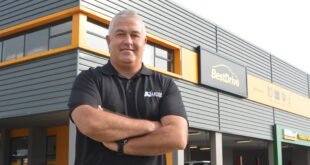 Buying a car, even a second-hand one, is a big financial commitment and the buyer needs to know they are getting bang for their buck, along with all the things which they most desire in a car. Safety should always be a top priority but how certain can one be that your chosen vehicle has never been involved in a serious accident?
Buying a car, even a second-hand one, is a big financial commitment and the buyer needs to know they are getting bang for their buck, along with all the things which they most desire in a car. Safety should always be a top priority but how certain can one be that your chosen vehicle has never been involved in a serious accident?
Jacques Viljoen, national director of the South African Motor Body Repairers’ Association (SAMBRA), a proud association of the Retail Motor Industry Organisation (RMI), says unfortunately this is one of the main reasons SAMBRA has been campaigning so hard for an open and transparent Vehicle Salvage Database (VSD) of all vehicles that have previously been “written off” by insurers.
“Since we started this drive, we have found a concerning number of vehicles that have been severely damaged in accidents often ending up being repaired and returned to the road. To the untrained eye these cars may look perfectly acceptable but, upon closer inspection, one may be shocked at the quality of the repairs and the severity of the previous damage incurred,” says Viljoen.
Roadworthy Not Enough?
According to SAMBRA when you buy a second-hand car, it comes with a roadworthy certificate. This certificate alone will not provide confirmation of material defects being present.
“A roadworthy certificate is a legal requirement to complete the registration for transfer of ownership when one acquires a used motor vehicle, or for any vehicles carrying passengers for reward, like mini-busses/busses/heavy load vehicles.
”A roadworthy test conducted by the vehicle examiner identifies visual defects with the electrical items, bodywork components, steering, suspension, and interior seatbelts and an overview of the undercarriage. It makes sure the vehicle is “roadworthy” but will NOT necessarily pick up if the vehicle has been in a previous collision and then repaired,” says Viljoen.
Julian Pillay, national director of the Vehicle Testing Association agrees, saying there currently needs to be far more emphasis and discussion centred around vehicle inspection controls, particularly periodic testing of vehicles. This will entail the re-testing of vehicles beyond a certain age, even if it does not change ownership, for roadworthiness.
Viljoen says until the consumer can be 100 percent sure of the status of the second-hand vehicle they are purchasing, particularly if they have viewed it online, they are encouraged to educate themselves, by taking the following steps and taking control of their car buying journey.
- It is always advisable to physically view the car you are interested in buying. If you are at all concerned, seek out the assistance of an accredited SAMBRA motor body repairer who has the expertise to spot hidden repairs and assess the structural integrity of the vehicle. Remember that it is always worth doing the extra checks as all RMI accredited workshops and motor body repair shops comply with the strictest standards and criteria to protect consumers.
- It is advisable to consider a comprehensive multipoint check on the car as there is a difference between a roadworthy test and a multi-point inspection. “Essentially a roadworthy inspection reviews the safety items of the vehicles as specified in the National Road Traffic Act (NRTA) and relevant standards, whereas a Multi-Point Inspection goes further and includes safety items as well as quality items. The multi-point inspection (MPI) covers a range of additional categories. It is conducted by a trained and qualified examiner of vehicles and will give you a far more comprehensive report on over 120 points of the vehicle. A MPI can be undertaken at several participating VTA members nationally. It would be best to call ahead to the nearest test station to ascertain if they provide the service.”
- If you are worried about its service history, you can pop into any franchised dealership that is a member of the National Automobile Dealers’ Association (NADA) and request them to check the service history of the car if you give them the VIN number. Any Motor Industry Workshop Association (MIWA) accredited service workshop will also be able to tell you if there are any mechanical faults.
“Remember, with so many complex moving parts in modern vehicles, it’s not uncommon to have underlying problems you may be unaware of. To catch any issues before they turn into a safety hazard, it is advisable to get the experts involved and do a thorough inspection. Knowing the condition of a vehicle can help you not only catch and address potential issues before they lead to dangerous failures or costly repairs that ultimately devalue the asset you are buying.”
 ..:: AUTO REPORT AFRICA ::..
..:: AUTO REPORT AFRICA ::..




